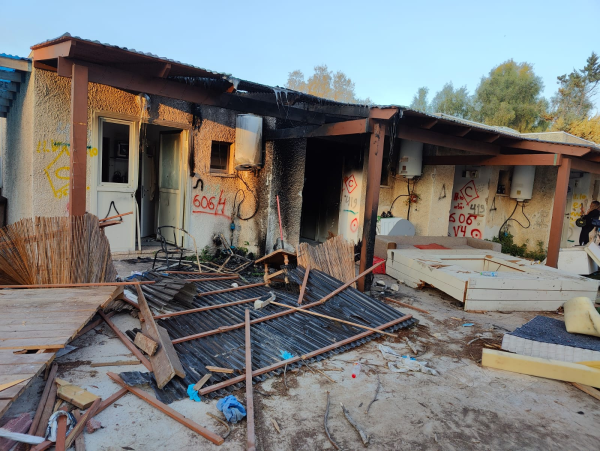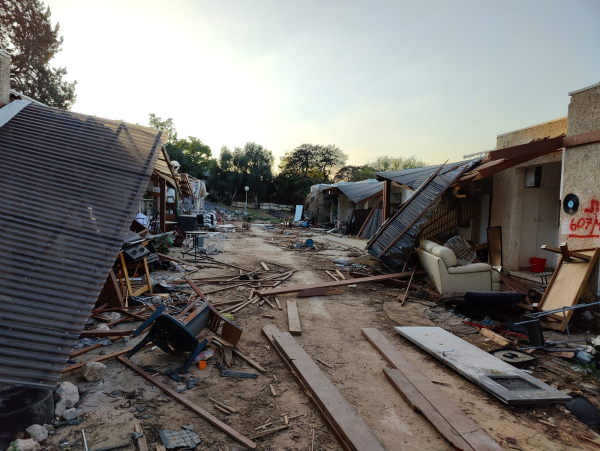By Leah Garber
“Share the stories, make sure they are heard.”
I returned home late tonight, at the end of one of the most significant days I had since the beginning of the war.
Since October 7th, I have shared the Israeli reality of the war and its horrors through my eyes—Israeli eyes.
Today I had the privilege of seeing the war through different lenses—through the eyes of JCC executives and staff who are here on a solidarity mission. Despite the risks, this amazing group of JCC leaders arrived in Israel in the middle of a war to deliver one message, which they kept repeating throughout the day: “We are here from JCCs in New York, New Jersey, and Pittsburgh, bringing the love and support of millions of Jews worldwide.”
The plan for the day included a visit to the southern city of Sderot, where fewer than 10% of the city’s population remains; the rest left for fear of the missiles.
We saw firsthand the intensity of the destruction, but more than that, we witnessed the power of the community’s resilience—the beauty, bravery, and resourcefulness of the city’s residents.
We met Ronen, head of the city’s security, who rescued two little girls from the back seat of their family’s car when it came under fire on October 7th. The girls’ parents were murdered in the car. When Ronen approached them, the girls, out of sheer fear, asked him, “Are you Israeli?” Two orphans, who will forever carry the horrifying sights of their parents’ murders with them and for whom every car ride will now be associated with terror, evil, and with the ghastly death of their ema and abba.
We met Alona, who on the morning of October 7th, found herself hiding in a coffee shop for 12 hours with others who had fled to the shop to escape the terrorist who drove through the streets wildly, as if they were the masters of the town and whose every intention was to sow destruction and death. Alona didn’t think she would survive. When the sounds of gunfire got louder and the screams of the murderers got closer, she realized she had no chance and texted her husband asking him to tell their children that she loved them.
From Sderot, we drove to Kibbutz Kfar Azza, which is closer to the Gaza border. There we met Adiel, a reserve officer who secured our visit to the kibbutz. It was one of the most surreal visits I’ve ever had. On one hand, the front of the kibbutz looked like a kibbutz should, with well-kept paths; welcoming houses exuding warmth; and beautiful ornamental gardens. In the back of the kibbutz, we went from heaven to hell in one second. On path after path we saw houses burned to the ground, horrendous destruction, and residents’ scattered, shattered, and charred possessions everywhere—furniture, clothing, household items, photos, the very things that make a house into a home. There are few words to describe the sight, but the scene clearly illustrates much more than malice. Here we saw the terrorists’ efforts to destroy, loot, and debase; we saw evidence of the monstrous hatred that drove them and led them to steal innocent lives. The contrast between what was, until 41 days ago, a bustling, thriving kibbutz and the hell on earth that it became was evident in the silence of death hovering above and in the smell of fire still lingering in the air. It was an unbearable sight.

 As if the sights and smells weren’t enough, Adiel’s words added to the horror as he told us that while hiding, survivors heard “regular people,” Gazans, seemingly innocent citizens, men and women, some of them mothers carrying their children, arrive to loot the kibbutz—taking clothes, dishes, furniture, and whatever else they could from the destroyed homes. With their children in tow, the women measured clothes, chose utensils, and imagined using these Israeli goods in their own homes in Gaza. They stole what they could, even as they heard the cries of babies, skipped over rivers of blood, walked among the bodies, smelled the fires. They must have felt death all around, but apparently not enough to stop them from looting. The evil went beyond those carrying weapons and knives, extending to those of their own people who took part in demolishing Jewish homes—just because they are Jewish. We listened to Adiel amidst the destruction and loud explosions and smoke coming from Gaza, which made for an eerie, fitting setting. On an outer wall at the entrance to one of the destroyed homes, Israeli rescuers had left the following note for the forensic units that would follow them: “Human remains on the sofa.” I leave it to you to imagine for yourself the sights that awaited the rescuers when they arrived.
As if the sights and smells weren’t enough, Adiel’s words added to the horror as he told us that while hiding, survivors heard “regular people,” Gazans, seemingly innocent citizens, men and women, some of them mothers carrying their children, arrive to loot the kibbutz—taking clothes, dishes, furniture, and whatever else they could from the destroyed homes. With their children in tow, the women measured clothes, chose utensils, and imagined using these Israeli goods in their own homes in Gaza. They stole what they could, even as they heard the cries of babies, skipped over rivers of blood, walked among the bodies, smelled the fires. They must have felt death all around, but apparently not enough to stop them from looting. The evil went beyond those carrying weapons and knives, extending to those of their own people who took part in demolishing Jewish homes—just because they are Jewish. We listened to Adiel amidst the destruction and loud explosions and smoke coming from Gaza, which made for an eerie, fitting setting. On an outer wall at the entrance to one of the destroyed homes, Israeli rescuers had left the following note for the forensic units that would follow them: “Human remains on the sofa.” I leave it to you to imagine for yourself the sights that awaited the rescuers when they arrived.
Again and again, Ronen, Alona, and Adiel pleaded with us: “Share with the world what you saw here today.” Like the other amazing people we met today, human angels all, they told us there is nothing they need but that we share the truth, so that what they endured will be known to the world. So that the cruelty of Hamas and the evil of those who joined in the looting, will be known. So that the sounds of the crying and the pain will be heard across the world. The world must know the truth!
At the end of this hard, emotional day, we returned home to the painful news that Israeli soldiers who are inside Gaza had located the body of Judith Weiss of Kibbutz Be’eri, who had been kidnapped to Gaza. Weiss was diagnosed with breast cancer a few months ago and was murdered before Israeli soldiers could rescue her.
On the 41st day of the war, the sights are still hard. They choke our throats and make us cry, and it doesn’t get any easier. Quite the contrary.
Seven-year-old Yuval, my sweet niece, told my sister, her mother, that she would like to go back to being a baby. Why? Because a baby does not know what Yuval already knows. Babies are not exposed to the evil that she now knows exists. Although, of course, the great majority of the horror wasn’t shared with her, young Yuval still feels that what she heard is more than she can hold. It’s too much, and she wants to go back to being a baby.
My sweet Yuvali, this evil is too much for me, too. Too much for all of us. We cannot contain it. Like you, I also want to go back home —to the home I had on October 6, to the Israel before monsters invaded, destroyed, and robbed you and the rest of our children of their happiness and their innocence, to the degree they want to be babies again.
Watch Broadway musicians perform a beautiful “Bring Them Home” prayer, and may it be answered speedily and in our day.
Together, united, we will overcome.
Leah Garber is a senior vice president of JCC Association of North America and director of its Center for Israel Engagement in Jerusalem.
Reader Interactions